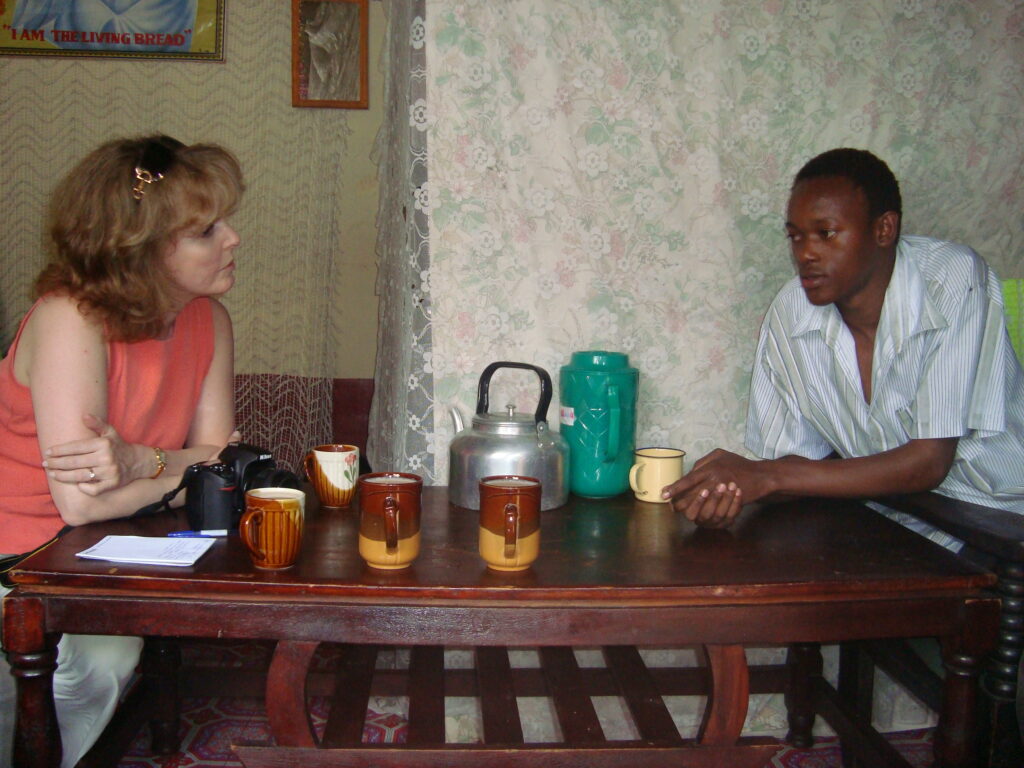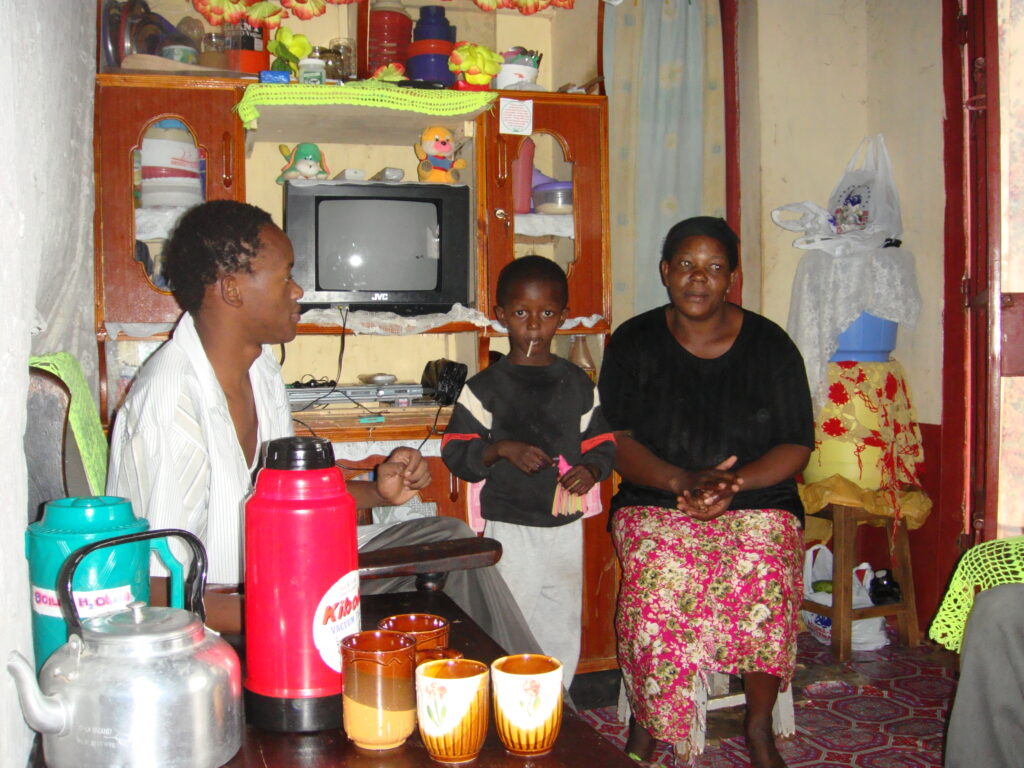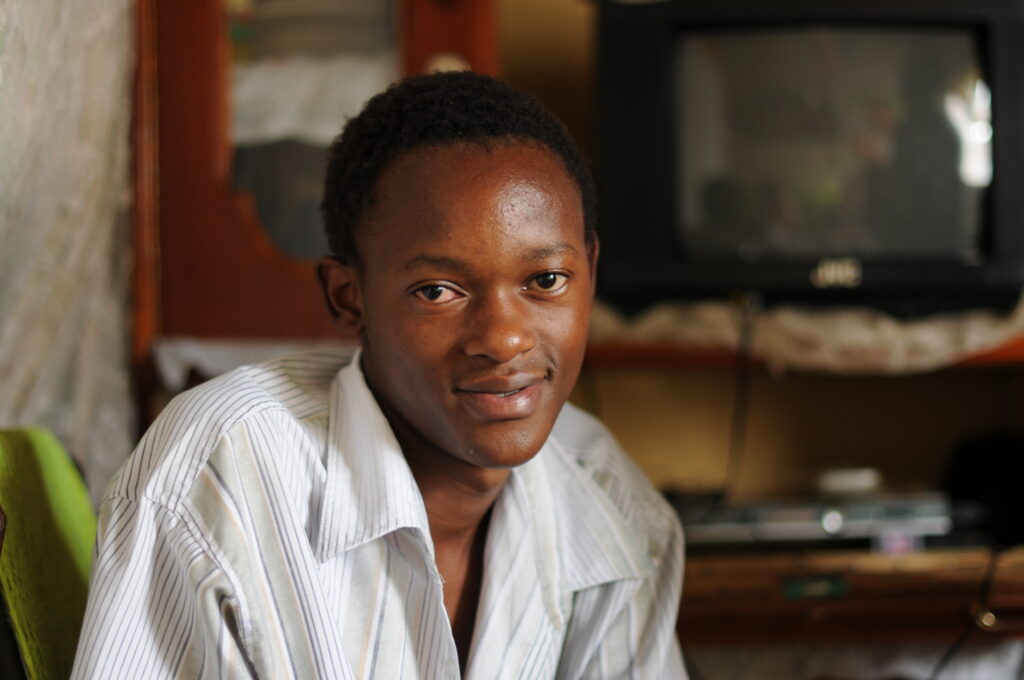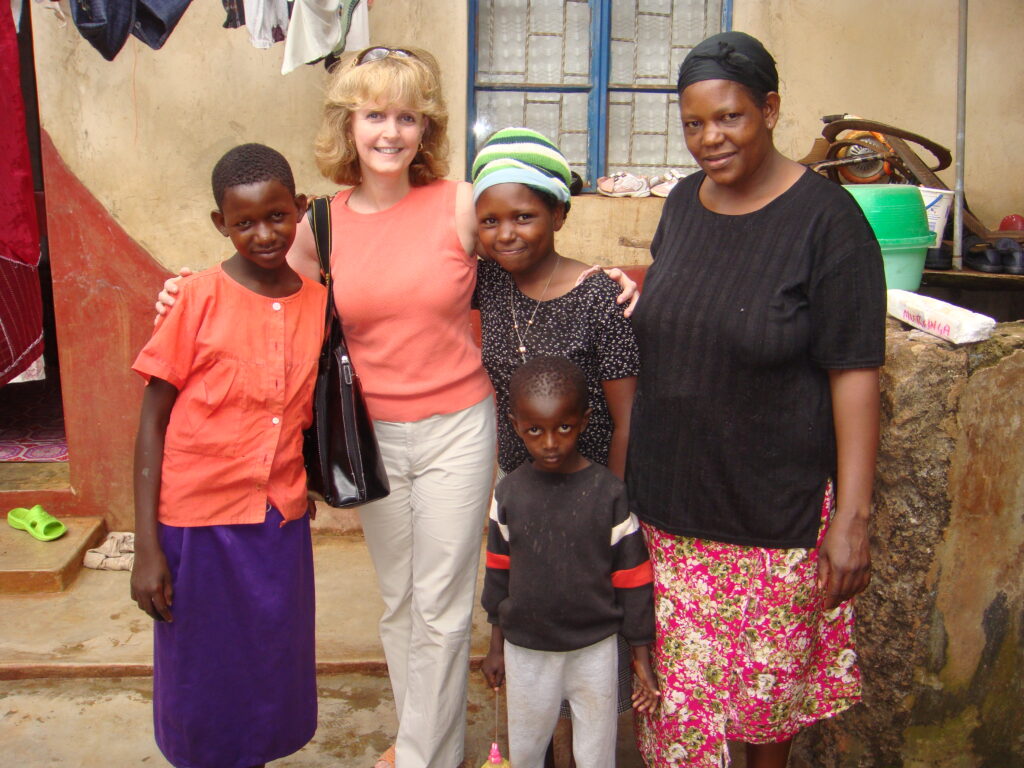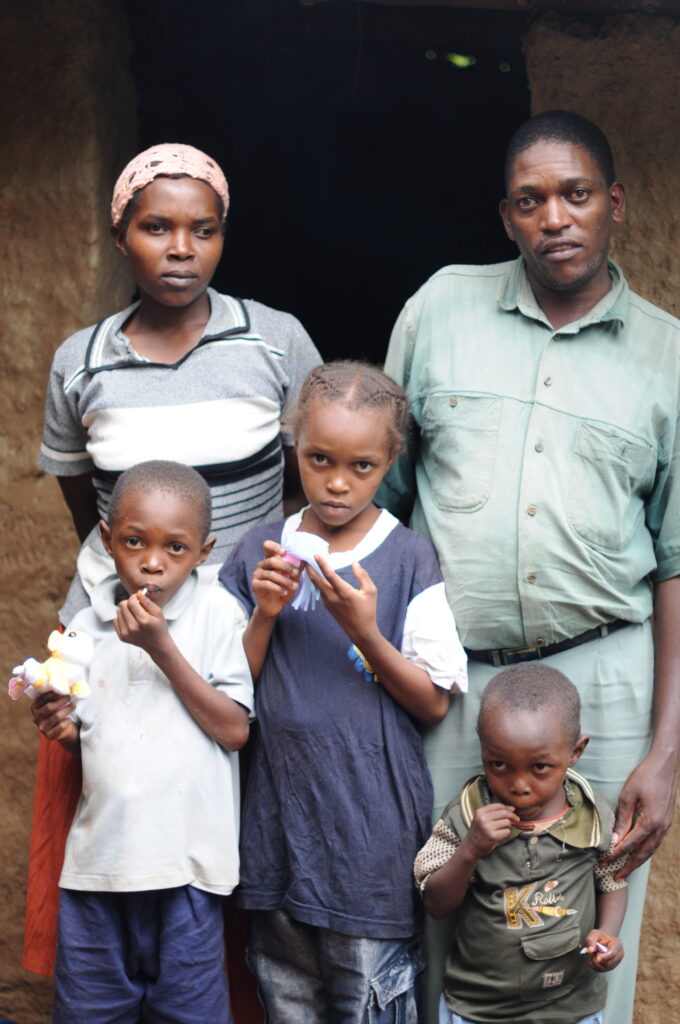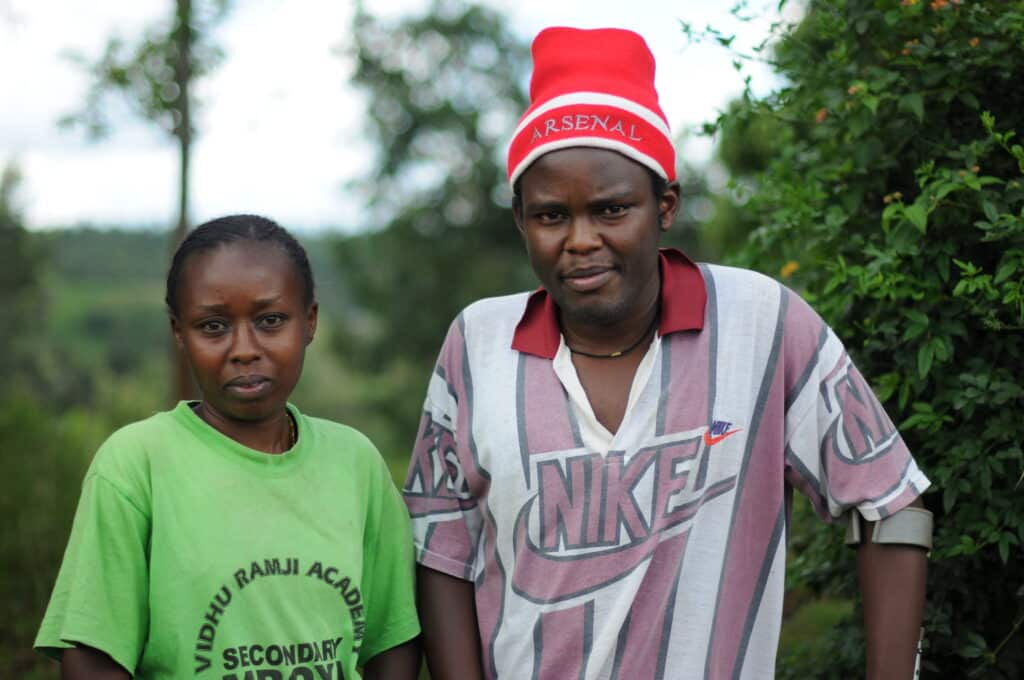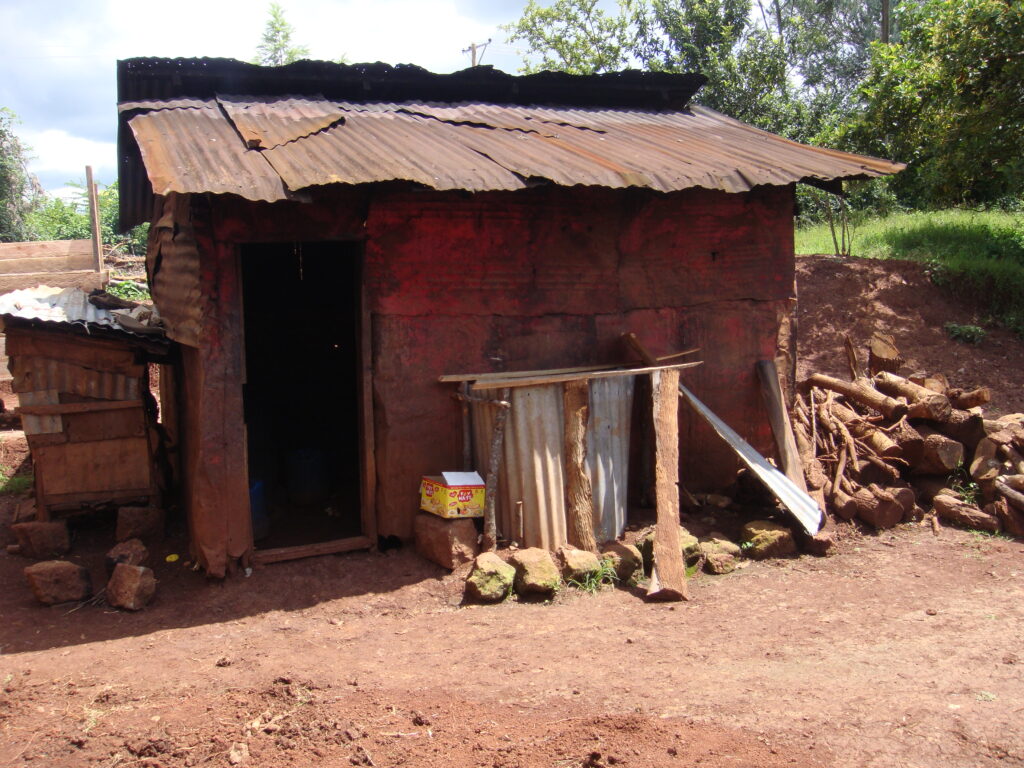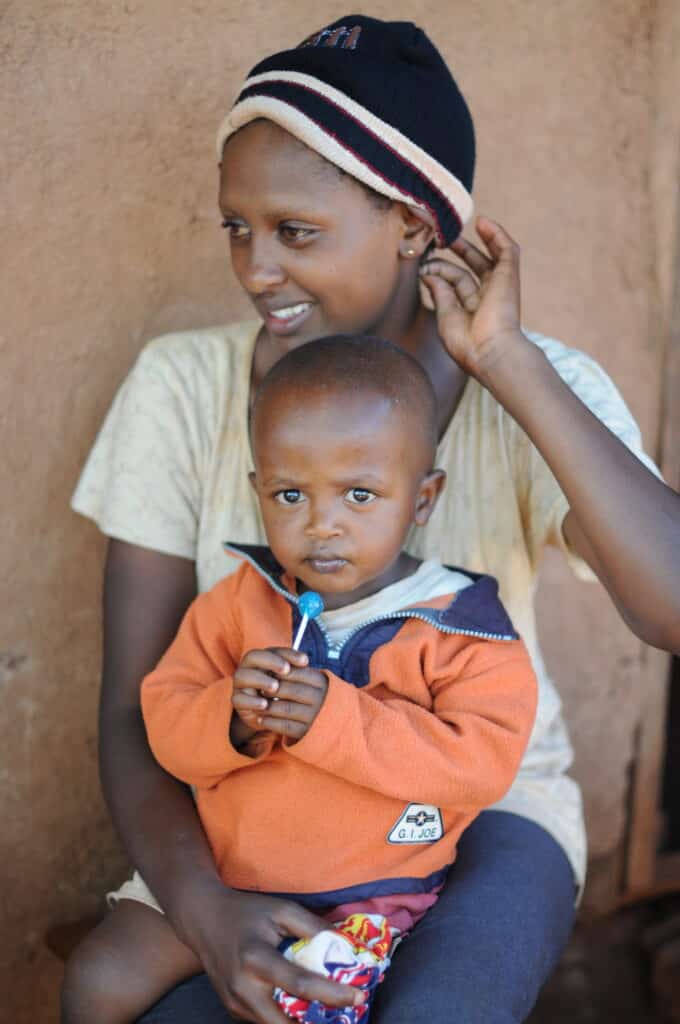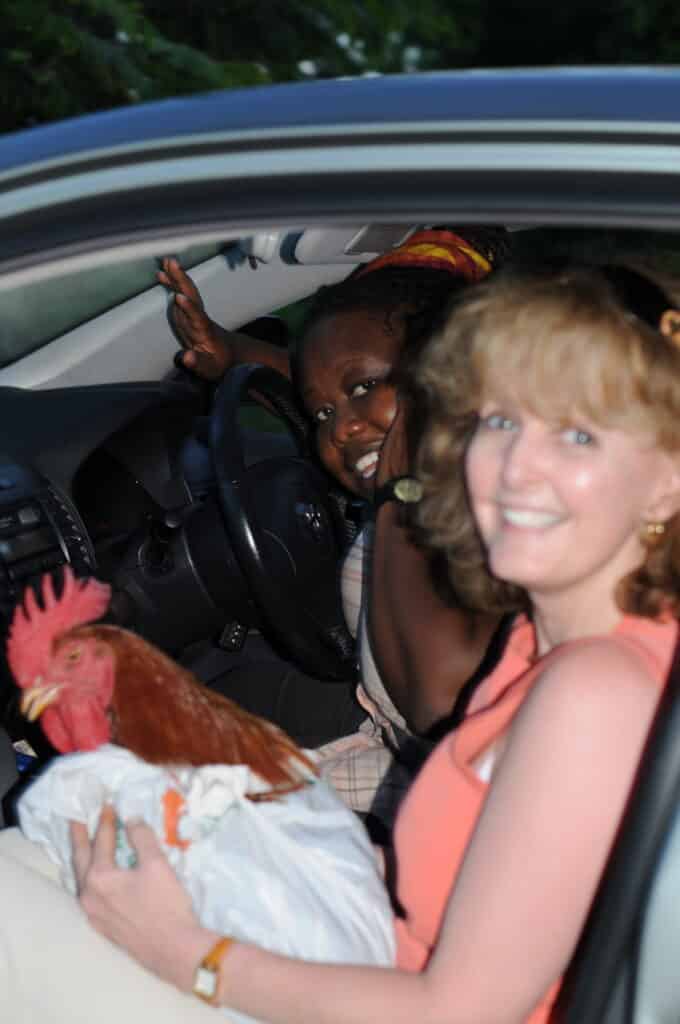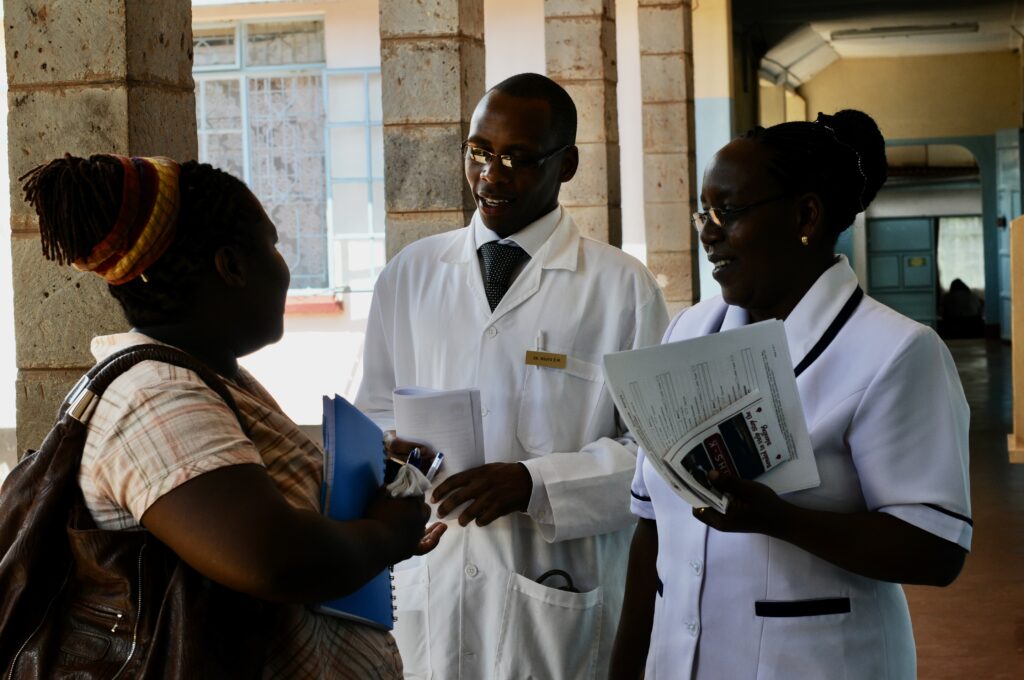
Tuesday April 27
Today was a field trip, outside of the bustling, clogged streets of Nairobi. We headed to Murang’a, a town about 90 minutes away, off on the highways pitted with deep and numerous potholes. The shoulders of the highways are crumbling and soft so in dodging the potholes, we have to be careful not to veer too close to the shoulders or we will need up in a ditch.
You may think Africa is hot (the very name means “Away from the cold”—A frika), but Kenya is quite pleasant, with cool breezes, mostly dry air, and even chilly in the evening. No wonder so any settlers came here and stayed. The climate, the rich red soil, the friendly people make Kenya a country where people dream of living.
Maureen Miruka, mother of two-year-old Ethan and founder of the Jose Memorial Hemophilia Society, was our fearless driver. With us also was Paul, the 24-year-old administrator of the Society. How nice that Maureen hired him—he has hemophilia and many of the young men with hemophilia cannot hold down jobs. Remember that there is no factor in Kenya unless it is donated, and the donations are only enough for a few.
Our first stop was the Murang’a District Hospital, where we met the gracious Senior Nursing Officer Danny Mengai. Joining us later was Dr. Nguyo. Maureen had met them previously, explained about hemophilia and this time brought with her their very first ever donation of factor! This is factor that my organization Project SHARE had donated to her organization. This was the kind of teamwork and outreach I like to see. Imagine: Murang’a has a higher than normal concentration of people with hemophilia and there has never till now been any factor in the hospital. And you can bet that fresh frozen plasma is hard to come by as donating blood is not a tradition in Kenya, or in any African country.
I learned today that a big teaching opportunity for the JMHS would come in December: this is when the vast majority of circumcisions are done. Why? I asked. For religious purposes? No, Maureen replied: school holidays. Boys are circumcised around age 12 and this is when we can get referrals for bleeding disorders to the Society. Dr. Nguyo assured us he would check with Maureen at that time, and also refer anyone suspected of a bleeding disorder.
Back in the Toyota and then on to visit patients. This was our very first official field visit—sorry, the second. We must give Paul credit. He had visited previously by himself to do the groundwork, and take down patient information for Save One Life. And he did an excellent job! Our goal is to start enrolling patients from Kenya, and ask anyone reading this blog to consider sponsoring a child form Kenya. The needs are terribly great and it won’t take much to change their lives.
Take Peter for example. Just down the street from the hospital, on a red dirt road, in a small apartment lives Peter, age 19, with hemophilia. He is thin and speaks softly, like most Kenyan boys. He was so curious about his condition, and wants to be a doctor when he grows up, “So I can help other people like me. Because I know how they suffer.”
That’s an understatement. I am not sure we can understand how much these children suffer, with no relief, night after long and desperate night. (Photos: Peter; his kitchen; Me with family)
Let’s imagine what it is like for Peter when he has a bleed. There’s no money to get to the hospital. He has no crutches, of course, no wheelchair. He remains housebound. He tries to hide it from his distraught mother. She is single, and caring for Peter, and his brother, who has emotional problems as well as hemophilia, and also has adopted her two nieces, abandoned by her sister. The mother makes only about $20 US a month washing clothes and housekeeping for people. Peter’s bleed worsens, as does his pain. At night they all sleep in one room (the only other room they have, which also functions as a “kitchen,” because it has a charcoal pot in it) probably a few of them crammed into one bed. If anyone moves, this sends shooting, excruciating pain from the bleeding joint. Peter can’t get up and watch TV as a distraction, or Facebook, or do Wii, or pop a painkiller, or grab ice from the freezer or treat himself to a Coke. They don’t have a refrigerator, and own nothing but the basics—a table, chairs, couch, a bed or two, a boom box. If he gets up he’ll wake everyone. And in Africa, kids don’t whine and demand and complain. They suck it up with dignity. He lies there all night, trying to control the pain. The last thing he wants is for his mother to find out, which will add to her worry and suffering. He learns to be stoic and fight the pain, because there is simply no other choice. This bleed goes on day after day and night after night. It finally subsides… until next week, when this scenario happens all over again.
This is his life, and he cannot imagine any other.
We record his family history, ask him about his schooling, and his plans. We learn that his brother is in a mental ward. The entire family was terrorized last year during the post election violence. Thugs entered their home, set it ablaze, and chased them out into the streets. This is a nice, Christian, impoverished family, with two young men with hemophilia; they deserve nothing of what has happened to them. The younger brother, already fragile, is suffering from post-traumatic stress disorder. We make plans to go visit him. He’s ready to come home, but the family has incurred $350 in fees and like most developing country hospitals, the patient is not released until the bill is paid. You hear that right. Peter’s brother could be there indefinitely. We’ll see about that.
Who wouldn’t want to sponsor Peter? What a lovely young man; so sensitive and sweet, so gracious and kind. If he were placed in America, there would probably be nothing he couldn’t accomplish with his winning perspective.
The road calls, and we soon leave, after first handing out some presents to the family. On to the next patient: Peter’s uncle, also named Peter. He is older, with a family: wife and two children. He lives, well, basically, in a jungle. We park by the side of the road, surrounded by banana plants, overgrowth, trees and vines. Someone actually lives in that thicket of vegetation. We pull over under a big tree and a crowd of children gather, from the other side of the street. They giggle and whisper, “Mzungu!” and cover their mouths. What does that mean, I ask Maureen. Maureen smiles and says, “White.” Not many people like me make it out here, I guess.
I dissolve our differences by hauling out my stash of Tootsie Pops. Never, ever travel in developing countries without them. They withstand the heat and luggage manhandling, and are beloved by everyone. I hand out one to each bystander and immediately have fans!
We should have brought machetes because to get to Peter the uncle, we have to step over rocks and push back the big banana leaves. A short walk down the twisty sort-of trail and we arrive at their plot of land. Such poverty.
A split-log home, tin roof, muddy ground. The floor inside the house is missing; it’s just mud. There is no electricity. There are indicators of various levels of poverty and this is one key: do they have electricity? Believe it or not, you can do without plumbing. An outhouse will do and most people in the villages have them. But when you don’t have electricity…. You might as well be living in the 1800s. No, even earlier, in this case.
This family owns nothing, nothing. No vehicle, hardly any furniture. A homemade chicken coop housed a few chickens that had no food or water and the heat was growing. I felt for them, sadly. They cackled unrelentingly. A dog was penned in the back, also in a homemade kennel, with hardly any ventilation, whining to be released. The children padded around barefoot, the wife was a bit cautious, not too friendly. (Photos: the outhouse; Peter with family)
I gave the children the customary Tootsie Pops, which they eagerly accepted, and a superball and a toy kitten that shook when you pulled his tail. They were frightened by the toy at first. Then they thought it hysterical, and they made it shake over and over. I had rescued some toys from the CVS store which operates right beneath my office. Apparently, they ditch whatever they don’t sell every month: perfectly good toys, baby items and medical items. I retrieved toys for kids, baby strollers, thermometers, heat wraps, you name it. Yeah, I am a Dumpster Diver and proud of it. Everything is neatly wrapped in clear plastic bags and in perfect, new condition. And these kids had a ball with the toys.
After our interviews with Peter, we headed for the next house. Also perched in a jungle-terrain, on a hill, Charles’s home at least has electricity. And the animals look well cared for. We were greeted by the father, Sampson, an elegant elder man, his wife, who eyed us warily, and later told us this was the first time she ever met anyone else who had a child with hemophilia (! She must be about 60), Charles and his new wife, Hannah.
Charles approached us on a crutch, with obvious crippled joints. But what a nice young man: age 24, speaking fluent English (Kiswahili is the national language but most educated people—meaning grammar school and high school—can speak English as Kenya was once an English colony). Charles shared so much with us: his hopes to return to college and study electrical engineering, because he has a knack to fix anything, and he longs to contribute to his family. His parents are elderly. How much longer can they work and support him? It’s such a source of shame for an African man to be supported by his own parents. Hannah was sweet and gave me a little tour of their farm. The animals were all housed in self-made, split-log cages, but really well done and humane. A cow, goats, chickens and a dog. As clean as can be for living in jungle-like surroundings. They don’t have a refrigerator and Charles could really use one for ice for his joints. He lives so far from any hospital and they of course don’t own any kind of transportation! Not even a horse.
We were so impressed with the family. So good, high hopes, willing to work hard. Charles needed $350 to get his school fees paid for so he can return and get his degree. He just doesn’t have that kind of money. People like him, Peter and all the others we met live day to day. It’s truly survival. And when thugs burn your house down, or the rains come and wash away your farm or crops, you are really threatened with starvation and just pure survival.
We just cannot imagine their daily lives. I have a hard time, and I have seen it in front of me. How do they do it?
And yet I never hear a complaint, or curse. The only think I hear are blessings: May God bless us for our work, may we have a safe journey, thank you for helping us. Now maybe you can see why I return over and over. Despite their poverty, they have a richness many of us in developed societies lack.
We parted on such happy terms, and we all chattered on the way back about what a diamond in the rough Charles was! Peter too, in a different way.
We visited two more families, Stanley, a grown man, and Derrick, a one year old and actually Paul’s nephew. By then it was really growing late and I was out of Tootsie Pops and just about anything else in my purse that I had given away.
Our last stop of the day was at a home of a better off family. They have a proper concrete home, electricity, and the father is employed as a teacher. The son with hemophilia neatly dressed with shoes. We had a nice courtesy visit, and afterwards, to show their appreciation, the mother presented Maureen with a magnificent rooster!
They popped the rooster into a plastic bag, tied the top and carried it out to the car, its crested head popping out. When they opened the “boot” (trunk), the animal lover in me sprung out. We just can’t put a rooster all trussed up in a plastic bag into a hot trunk! It was 90 degrees and we had a two-hour journey back on horribly bumpy roads! The poor thing…
So I rode with the rooster in my lap, all the way back to Nairobi for two hours at night, petting it as if it were a cat. The doorman at the Holiday Inn was pretty surprised when he opened my door to let me out!
I’d call it a successful day all around for Save One Life and Save One Rooster.
(Please consider sponsoring one of the families mentioned above! Just $20 a month. See http://www.SaveOneLife.net)
